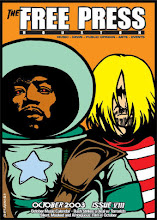Wong Kar Wai slows time

Real movie fans appreciate the delicate nuances of their favorite directors while the media at large (film blogs, daily newspaper reviews) tend to negatively grade films if the helmer stays true to his form. Think Wes Anderson with Darjeeling Limited and now Wong Kar Wai with My Blueberry Nights.
Instead of celebrating the cinematic glee with which such directors explore their own space within commercial movie making they complain that the person is in a creative rut or that they are not advancing as artists. Honestly I would rather watch any film from an accomplished director than a year’s worth of programmers that litter the multiplexes with new titles every weekend.
Kar Wai Wong, the way his name is stated in his home country, pronounced the reverse way in domestic nomenclature, was born July 17, 1958 in China, but grew up in Hong Kong. American audiences have seen his work regularly distributed on the art house circuit since 1994’s Chungking Express. Kar Wai’s films lean not so much towards the non-linear as they bow in the direction of dreamy memories. Breaking up regular rhythm with slow motion is a visual motif oft repeated in his films. While Kar Wai had used Christopher Doyle as his regular DP (and their collaborations are visual explorations in breaking up space and time, just see In The Mood For Love) for most of his career with My Blueberry Nights Kar Wai worked with Darius Khondji a noted cinematographer in his own right with the atmospheric thriller Se7en to his credit.
“My communication with the DP is simple,” Kar Wai told Free Press Houston in a phone interview. “With Doyle it was a collaboration of 15 years. We would try to surprise each other.
“Darius is different. Instead of talking we took a trip to understand the journey of the characters. We talked about how we see their space. The choice of the director is how to frame a shot, the rest I leave to the DP.”
My Blueberry Nights follows Norah Jones (in her acting debut) as she walks in and out of the lives of customers of the various bars and cafes where she works. The locales include Las Vegas, Memphis and New York. In particular Jude Law works in Gotham cafeteria that serves desert late at night and keeps a bowl of keys that have been abandoned by departing lovers.
“There's nothing wrong with the Blueberry Pie, just people make other choices. You can't blame the Blueberry Pie, it's just ... no one wants it,” Law’s character tells Jones early on. She falls asleep at the counter with a bit of crème on her lips. As Law leans over to kiss the crumbs off, Kar Wai changes angles. “That first kiss is like an eclipse, a surprise,” notes Kar Wai. Later in the film the shot is repeated, only on the reverse cut the camera is directly overhead looking down on the couple. “The top shot deals with the distance between the characters,” explains Kar Wai.
Many of the set-ups emphasize the surroundings of the actors. For instance Law has a sequence where he fiddles with the store’s security camera, seen from a high angle, while he’s standing on a ladder. At the bottom of the frame we can see his security monitor, which is really one of the video replay monitors (marked with tape for the film’s aspect ratio) so common on movie sets. As is his style Kar Wai shoots this scene at 4 frames-a-second resulting in a stop-and-go motion. Other scenes were shot at 12 or 8 frames-per-second. (Regular motion is 24 f.p.s.). “With a bigger aperture you use less light, it creates a dream feeling,” continues Kar Wai. Choosing his shots he maintains that cinema has produced 100 years of movie rules and frankly he “doesn’t care about eyelines.”
My Blueberry Nights also stars Rachel Weisz, David Strathairn, Natalie Portman and Cat Power (Chan Marshall).
The film had secured rights to a couple of Cat Power songs and indeed in another signature motif Kar Wai keeps reintroducing one track, “The Greatest” over and over not unlike the way a Nat King Cole warbler was used repeatedly during In The Mood For Love. The film was on location in New York and Cat Power was playing in town. “I heard she was shy,” remarks Kar Wai about meeting her backstage for the first time. One speaking role had yet to be cast and Kar Wai felt her understated manner would be right. The scene plays out in brownish hues late at night when she shows up at Law’s place to get back her keys.
Kar Wai may have found a relation between singers (Jones, Marshall) and his mode of motion, his motivation for actors and the general sense of coolness and atmosphere that his films exude. My Blueberry Nights, Wong Kar Wai’s first film in English, opens at the Angelika this Friday.









0 Comments:
Post a Comment
<< Home